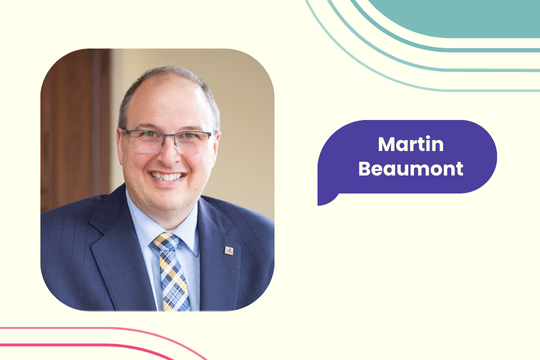In this section :
Sometimes an event doesn’t just disrupt a system. It changes how we see it, and we cannot forget.
For Martin Beaumont, President and CEO of CHU de Québec – Université Laval and a board member of Healthcare Excellence Canada, the death of Joyce Echaquan was such a moment. Her passing provoked a profound reckoning across the health and social services network. This tragedy, heavy with grief, jolted collective awareness. It reminded us that dignity is not an abstract value but a daily obligation. It underscored the urgent need to act, to re-examine behaviours and structures so that such injustice never again finds a place in our care settings.
Learn more about Martin Beaumont’s perspectives on patient safety.
Moving beyond the numbers
In the early 2000s, patient safety was defined by numbers, standards and compliance. “We were focused on the rational and the transactional,” Beaumont recalls. For Beaumont, these tools remain essential, offering the metrics we track and compare. But they do not reveal the people, the relationships or the lived experiences behind the data.
At CHU de Québec – Université Laval, safety now includes what can’t be tallied: the climate among colleagues, the cohesion of teams, the trust and respect between patients and providers. The real shift, Beaumont says, is not abandoning data but adding a dimension that is both human and transformational, bringing real meaning to numbers and methods.
Learning with and from others
Beaumont calls Healthcare Excellence Canada “an extraordinary school,” one that continues to shape his thinking. It was there he first encountered the language of truth, reconciliation and cultural safety. These ideas resonated deeply and gradually became levers for action within the organizations he leads.
Through shared learning with colleagues across the country, he saw both the scope of the challenge and the promise of progress. He noticed how some provinces were already adapting services for First Nations, Inuit and Métis communities. The lesson was clear: reconciliation can’t happen in isolation. It grows from shared perspectives, reciprocal partnerships and collective solutions.
Putting convictions into practice
These lessons have taken shape in concrete ways at the CHU and across the Université Laval Integrated University Health and Social Services Network, which Beaumont chairs. A Cultural Safety Centre was created through close collaboration with communities and new hospitality rooms were developed for patients traveling from the North to receive cancer treatment.
Nearly 12,000 staff members, including clinicians, managers and support workers, have now received training in cultural safety. The goal is ambitious yet simple: to transform each encounter so that respect and openness become the hallmark of every interaction. Among the measures supporting this change is the creation of an Indigenous advisory committee. From this work, ten facilities in Eastern Quebec have adopted a standardized policy on cultural safety training.
That same resolve extends to a team participating in the EXTRA program, which is embedding cultural safety strategies into EVAQ, Quebec’s aeromedical evacuation system. This work is a reminder that reconciliation extends beyond hospitals and into pre-hospital services, where each action carries weight.
Trust as the cornerstone
For too long, many First Nations, Inuit and Métis have hesitated to step into health facilities, afraid of the judgement, stigma and stereotypes that they continue to experience within health systems. “They do not always come to us because they do not trust us, because they fear being judged,” Beaumont admits.
Ultimately, it is for First Nations, Inuit and Métis, not institutions, to decide if care feels safe.
Today, within the CHU de Québec – Université Laval and its network, signs of change are emerging. Families are making use of the spaces created for them. First Nations, Inuit and Métis advisory committee members continue to share their perspectives and contribute to new projects across the network.
“When you truly believe in something, you devote time, energy and resources. That is when change takes root, when it inspires and when it transforms.”
For Beaumont, reconciliation is not an aspiration, but a deep personal value and commitment or “zone d’obsession”. A commitment which compels him to dedicate time, resources and influence to make and sustain change. For him, that personal value and commitment grew into a constructive obsession, one that guides strategy, shapes priorities and drives change across his entire network.
The work goes beyond isolated projects; it is about weaving reconciliation into organizational culture and building trust step by step, through every decision and every action.
The road ahead
Every training delivered, every project completed, every commitment honored becomes a promise kept. Trust is regained step by step, through listening deeply, asking questions and making space for all voices.
And in our own settings, are we ready to listen?
To create spaces where every voice matters?
To take the actions that allow trust to grow?
Cultural safety is not a destination reached once and for all. It is a challenging but necessary journey that transforms care relationships and, ultimately, lives.
It is up to us to continue walking that path.
Learn more about Joyce's Principle, which outlines commitments and actions to support cultural safety in healthcare in Quebec and Canada.
